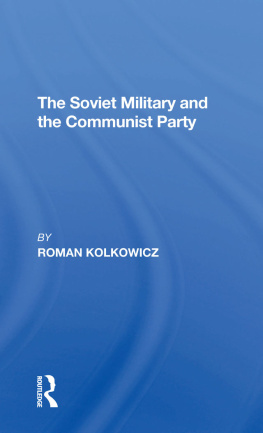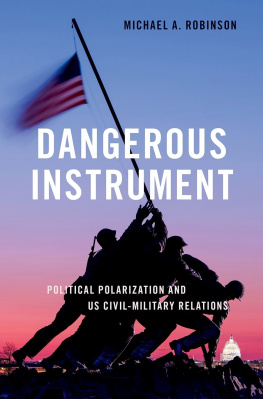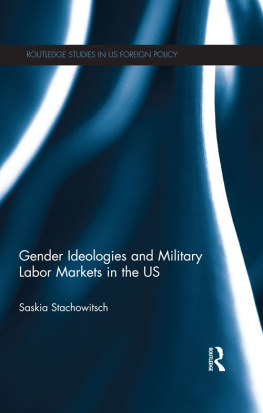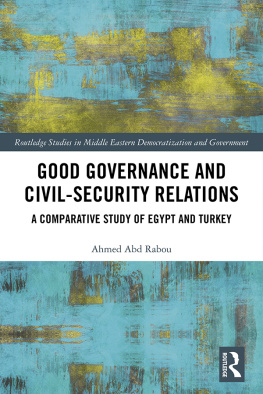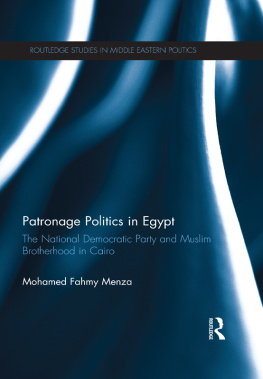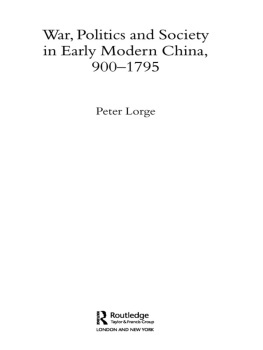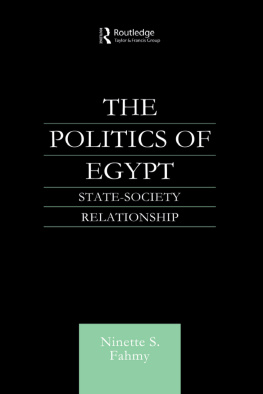POLITICAL ROLES AND MILITARY RULERS
By the same author
Military and Politics in Israel 19481967
Egypt, the Praetorian State
The Military and Politics in Modern Times
Politics and the Military in Israel 19671977
POLITICAL ROLES AND MILITARY RULERS
AMOS PERLMUTTER
First published in 1981 by
FRANK CASS AND COMPANY LIMITED
This edition published 2013 by Routledge
2 Park Square, Milton Park, Abingdon, Oxon 0X14 4RN
711 Third Avenue, New York, NY 10017
Routledge is an imprint of the Taylor & Francis Group, an informa business
Copyright 1981 Amos Perlmutter
British Library Cataloguing in Publication Data
Perlmutter, Amos
Political Roles and military rulers
1. Military government Addresses, essays, lectures
2. Near East Politics and government Addresses, essays, lectures
I. Title
322.50956 JQ1758.A56M/
ISBN 978-0-7146-3122-6 (hbk)
All rights reserved. No part of this publication may be reproduced, stored in a retrieval system, or transmitted in any form, or by any means, electronic, mechanical, photocopying, recording, or otherwise, without the prior permission of the publisher
Photoset in Baskerville by Saildean Limited.
The chapters in this book appeared in their original form in the following books and journals. Several have been revised and updated for publication in this collection. constitute an exchange of views between the author and Prof. Manfred Halpern.
: | From The Military and Politics in Modern Times (Yale University Press, 1968). |
: | From Manfred Halpern, The Politics of Social Change in the Middle East and North Africa (Princeton University Press, 1963). |
: | From Comparative Studies in Society and History, Vol. X, No. 1, October 1967. |
: | From Comparative Studies in Society and History, Vol. 11, No. 3, January 1969. |
: | From Comparative Studies in Society and History, Vol. 12, No. 1, January 1970. |
: | From The Western Political Quarterly, Vol. XXII, No.,4, December 1969. |
: | From World Politics, Vol. XXII, No. 2, January 1970. |
: | From Egypt: The Praetorian State (New Brunswick, N.J., Transaction, 1974). |
: | Ibid. |
: | A paper presented at the ASA/LASA Convention, Houston, Texas, November 1977. |
: | From The Journal of Strategic Studies, vol. 1, no. 2, Oct. 1978. |
This book is a collection of essays which represents my labours in the field of the military and politics in the last two decades. From the beginning I have tried to identify the political rather than the sociological and organizational explanation for military interventionism, demonstrated by the nature of military coups and praetorian corporatism among the emerging new states of the Middle East and Sub-Saharan Africa, the continuing role the military has played for over a century in Latin America and the emergence of its new corporative types in the major Latin American states. The politics of the military in the less developed countries as well as in the economically more highly developed Latin American states have become routine, a matter of fact and of life in over ninety per cent of the new states. In fact it is easier to identify the few nonpraetorian and non-interventionist states and regimes than otherwise. Only in India, Israel, Mexico, Kenya, Tanzania and Zambia (so far) and in the South Arabian and in Arab Gulf oil sheikhdoms and states has the military not been interventionist, yet in most of the above it has played and continues to play a most significant role in security-defence and strategic policy making and is an influential if not a major partner in the making of national security and foreign policy without seriously intervening in domestic politics.
When I began my studies and writing on the political role of the military in new states the field was still an undiscovered territory. Since then the number of political military interventions and military regimes has increased exponentially but not to the same degree as the literature on the subject. When I began my researches this comprised altogether less than five major books and under fifty articles. Today if the Kurt Lang bibliography (which badly needs updating) is taken as a guide the literature extends to well over a hundred books and over a thousand articles and published papers. This does not include the numerous unpublished dissertations, monographs and convention and seminar papers. Because the growth of literature has been so rapid and uneven, some generalizations and an overall view are needed. Most of the studies (with the exception of an outstanding few), both the empirical and conceptual endeavours, do not yet demonstrate sufficient confidence in differentiating the political explanations for military interventions from other respectable and valuable sociological and organizational explanations of civil-military relations. My publisher therefore thought it might be useful to collect my writings on the subject.
I have added new material to earlier essays but I have also included three new essays never before published, dealing with the political stimulus and cause for military interventions, regimes, coups and praetorianism. This book represents an integration of research papers and empirical country and area studies with overarching theoretical essays. The collection emphasizes my analysis of (1) types of direct and indirect military rule (ruler and arbitrator) (2) types of military intervention (coups, civilian-military alliances) and (3) corporate-professional types of interventionism.
I have attempted above all to demonstrate that corporatism, not professionalism, is a prima facie case for interventionism and that military professionalism is only one guarantee for non-interventionism. The major arguments I advance to persuade the student of modern military and politics are as follows:
(a) There is no correlation between military interventionism and internal organizational conflicts of the military establishment. The explanation of military interventionism has to do with political-structural and institutional weaknesses of regimes and of states. The most conspicuous indicator of political and institutional instability is regime illegitimacy and the inability to secure political support through political channels.
(b) The military interventionists are on the whole a few conspiratorial officers who do not work in the open; on the whole they are not progressive if compared with their civilian counterparts, allies or adversaries; they are not a new middle class of progressives, for they are neither cohesive nor sustaining; at best they represent traditional middle class orientations, however corporative, technocratic and technologically advanced some of them might be (especially in Latin America); they are not revolutionary and are at best reluctant reformers; and some of them (especially in sub-Saharan Africa) are no more than petty tyrants and kleptocrats.


